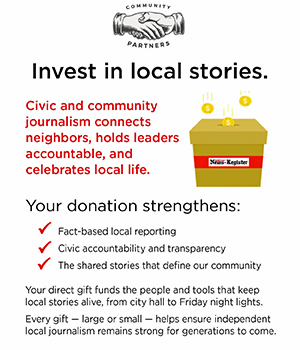Carla Canseco: Experiencing trauma of families torn apart
I am a Latina student at Linfield College who has traumatic personal experience with family separation.
Though awareness of this U.S. immigration practice has just reached the surface within our society these past few months, I discovered it first hand when I was 15.
As a child of immigrants coming from an extended family of immigrants, the things I have witnessed and experienced have shaped who I am. They color the decisions I make every day and fuel my commitment to help my community.
Growing up, I never understood what my family and I were at risk of losing. It didn’t fully register with me until my cousins experienced separation themselves and I saw how much this event affected their lives.
Right after Thanksgiving that year, my dad received a call informing him my uncle had been detained and was facing deportation.
I was confused. My first thought was, “What about my aunt and cousins?”
I wondered if my uncle would be coming back for Christmas. I didn’t understand what was happening.
Later, I understood. And I learned there was nothing any of us could do.
I saw how much it affected my aunt and cousins — not only financially, but also emotionally.
My older cousin was 13, my younger cousin 8.
The 13-year-old was a great student, earning A’s and B’s and involved in both school and after-school activities, including soccer.
The 8-year-old loved going to school. Learning a new language was challenging, but she worked hard at it, in order to communicate with her friends and teachers.
My cousins were living the American Dream and enjoying all the opportunities it afforded. Then these opportunities were ripped away from them.
What my cousins and aunt went through in the loss of their father and her husband was unjustifiable. The trauma not only caused them to be separated from their dad, but also changed their living situation.
My aunt had to sell everything she owned and pick up more hours at work in an attempt to make ends meet. But it wasn’t enough, so she moved in with my grandma.
These sudden changes from my uncle’s deportation caused both my cousins to change drastically.
The 13-year-old started skipping school, failing classes and getting into fights. He was soon on the verge of expulsion.
He was also working on the side, trying to help his mom pay the bills.
He wasn’t the only one struggling to cope either.
My 8-year-old cousin started getting into trouble as well. She started stealing from friends and skipping school.
The impact on both my cousins was severe.
But it made sense. How are you supposed to act when your father is ripped away from you and you don’t know if you’ll ever see him again?
In the end, my aunt and cousins moved back to Mexico to rejoin my uncle.
The older cousin quit pursuing an education. He’s now 19 and already has a family of his own.
This experience has shaped who I am as well. In fact, it has affected me in ways that others at my college wouldn’t understand.
Almost all the students who decide to have a study-abroad experience at Linfield are Anglo. But I decided to join them.
I didn’t understand why my Hispanic friends didn’t apply. I didn’t understand why I was the only brown Latina getting ready to visit the other side of the world.
The Trump administration took power as my time to study abroad grew near. And then I understood why.
As I began to pack my bags, people would ask me if I was excited about getting a chance to roam the streets of Europe on my own. I was excited, and expressed that.
But I was also feeling someting I didn’t express — fear and anxiety.
As a first-generation U.S. citizen, I never thought I would have to live in fear. But that had become a reality.
I prayed I wouldn’t receive a call in Europe telling me I had to rush home because my parents had been detained. I prayed that when it was time to come home, I’d return to both parents, ready to hug me and listen to my stories.
It was their dream to give me the best opportunities possible and mine to take the greatest advantage possible.
But I was afraid I’d experience what my cousins did. I was afraid I’d have to drop out and become the legal guardian of my 10-year-old sister.
Fortunately, I returned to an intact family at the end of my trip. That isn’t always the case.
I thought I was alone in harboring such feelings about traveling abroad. They weren’t something my fellow travelers could relate to.
I told them I was homesick. There was no way they could understand the type of homesick I was feeling.
Parents with passports were prepared to rush to their aid if anything happened. I didn’t enjoy that privilege.
But when I shared by feelings with my Hispanic friends, they understood. I realized I wasn’t alone, and am still not alone.
They also feared chasing their dreams traveling the world and experiencing other cultures. They feared becoming separated from their parents, just as I did.
For Hispanic families, this isn’t an issue just now arising. It’s an issue of long standing that’s become more troublesome.
Children who haven’t endured separation themselves have a taste of the trauma anway. They are haunted by the prospect of coming home to an empty house and never getting to say goodbye.
That motivates me to work with Lutheran Community Services and make it a career goal of mine to help families stay together.
CUTLINE












Comments